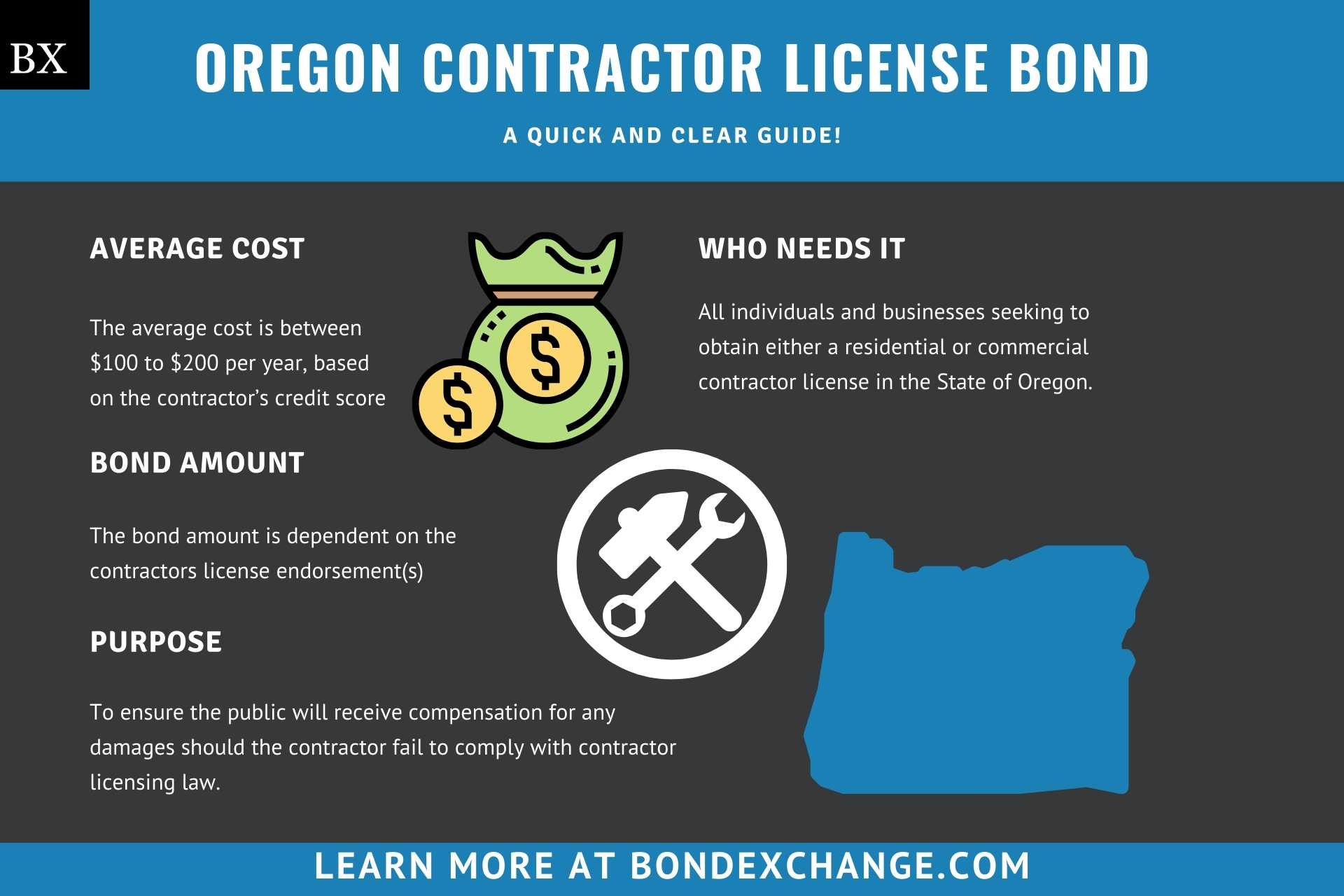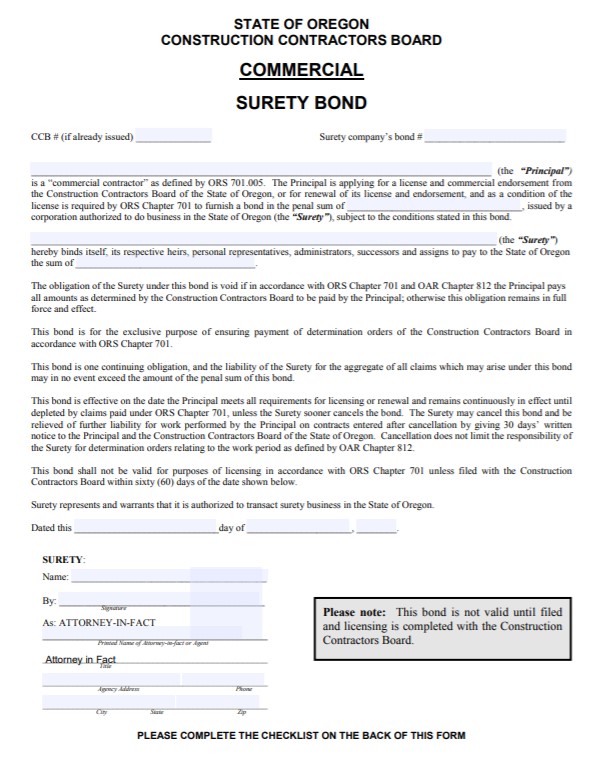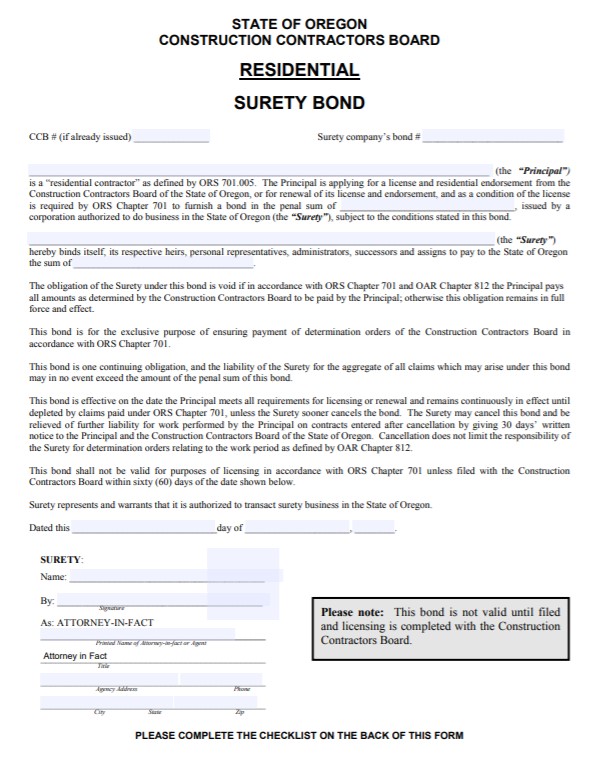Oregon Contractor License Bond: A Comprehensive Guide
January 8th, 2021

This guide provides information for insurance agents to help contractors on Oregon Contractor License bonds
At a Glance:
- Average Cost: Between $100 to $200 per year, based on the contractor’s credit score
- Bond Amount: Dependent on the contractors license endorsement(s):
Table 1.1
Residential Bonds
| License Endorsement | Bond Amount |
|---|---|
| Residential General | $20,000 |
| Residential Specialty | $15,000 |
| Residential Limited | $10,000 |
| Residential Developer | $20,000 |
| Home Services | $10,000 |
| Residential Locksmith Services | $10,000 |
| Home Inspector Services | $10,000 |
| Home Performance Store | $10,000 |
Table 1.2
Commercial Bonds
| License Endorsement | Bond Amount |
|---|---|
| Level 1 Commercial General | $75,000 |
| Level 2 Commercial General | $20,000 |
| Level 1 Commercial Specialty | $50,000 |
| Level 2 Commercial Specialty | $20,000 |
| Commercial Developer | $20,000 |
- Who Needs It: All individuals and businesses seeking to obtain either a residential or commercial contractor license in the State of Oregon
- Purpose: To ensure the public will receive compensation for any damages should the contractor fail to comply with contractor licensing law
- Who Regulates Contractors in Oregon: The Oregon Construction Contractors Board (CCB)
Background
Oregon Statute 701.021 requires residential and commercial contractors operating in the state to obtain a license with the CCB. The Oregon legislature enacted the licensing laws and regulations to ensure that contractors engage in ethical business practices. In order to provide financial security for the enforcement of the licensing law, contractors must purchase and maintain a contractor license surety bond (limits outlined in Table 1.1 and 1.2), for each license endorsement, to be eligible for licensure.
*Contractors working a qualifying public works project with a total project cost of $100,000 or more will need to purchase a $30,000 Public Works Bond in addition to their Contractor License Bond(s)
https://www.youtube.com/watch?v=DqfsMEp7MxY
What is the Purpose of the Oregon Contractor License Bond?
Oregon requires contractors to purchase the Contractor License Bond as part of the application process to obtain a contractor license. The bond ensures that the public will receive compensation for financial harm if the contractor fails to comply with the licensing regulations. In short, the bond is a type of insurance that protects the public if the contractor breaks licensing laws.
How Can an Insurance Agent Obtain an Oregon Contractor License Surety Bond?
BondExchange makes obtaining an Oregon Contractor License Bond easy. Simply login to your account and use our keyword search to find the “contractor” bond in our database. Don’t have a login? Enroll now and let us help you satisfy your customers’ needs. Our friendly underwriting staff is available by phone (800) 438-1162, email or chat from 7:30 AM to 7:00 PM EST to assist you.
At BondExchange, our 40 years of experience, leading technology, and access to markets ensures that we have the knowledge and resources to provide your clients with fast and friendly service whether obtaining quotes or issuing bonds.
Is a Credit Check Required for the Oregon Contractor License Bond?
Surety companies will run a credit check on the owners of the contractor company to determine eligibility and pricing for the Oregon Contractor License bond. Contractors with excellent credit and work experience can expect to receive the best rates. Contractors with poor credit may be declined by some surety companies or pay higher rates. The credit check is a “soft hit”, meaning that the credit check will not affect the contractor’s credit.
How Much Does the Oregon Contractor License Bond Cost?
The Oregon Contractor License surety bond can cost anywhere between $100 to $200 per year. Insurance companies determine the rate based on a number of factors including your customer’s credit score and experience. We also offer easy interest-free financing for premiums over $500. The chart below offers a quick reference for the approximate bond cost on the Oregon Contractor License bond.
Table 1.3
| Credit Score | Bond Cost (1 year) |
|---|---|
| 660+ | $100 |
| 659 or lower | $200 |
*The credit score ranges do not include other factors that may result in a change to the annual premium offered to your customers, including but not limited to, years of experience and underlying credit factors contained within the business owner’s credit report.
How Does Oregon Define “Contractor”?
To paraphrase Oregon Revised Statute 701.005, a contractor is any individual or business entity who performs or submits a bid to perform services related to the construction, repair, or alteration of a building or structure as an independent business.
How Do Contractors Apply for a License in Oregon?
Contractors in Oregon must navigate several steps to secure their contractors license. Below are the general guidelines, but contractors should refer to the CCB’s licensing page for details on the process.
License Period – The Oregon Contractor License is valid for two years from the date of issuance and must be renewed prior to the expiration date
Step 1 – Determine the License Endorsement(s)
Oregon requires contractors to obtain specific license endorsements corresponding to the type of structures the contractor performs work on. Contractors will need to obtain an endorsement for each type of structure they wish to work on. Contractors should refer to the endorsement guidelines to determine which endorsement(s) they will need. Contractors should also make note of the experience requirements for each endorsement type and ensure a member of their organization is qualified for each endorsement being applied for.
Step 2 – Determine the License Type
After selecting their intended license endorsements, contractors will need to select the type of license they wish to apply for. Below are the different types of the Oregon Contractor License:
-
- Residential – Performs work on residential structures only
- Commercial – Performs work on commercial structures only
- Dual – Is permitted to perform work on both residential and commercial structures
Step 3 – Complete the Pre-License Training
Contractors will need to assign a Responsible Managing Individual (RMI) to complete the required 16 hour pre-license training course. The RMI must be either an owner of the contractor company or an employee with a management role. Contractors can find a list of course providers here.
Step 4 – Pass the Exam
After the RMI has completed the pre-license training course, they will need to pass the licensing exam. Contractors can find more information on the exam here, and can schedule their exam appointment here.
Step 5 – Form a Business Entity
Contractors will need to form and register their business entity with the Oregon Secretary of State prior to submitting their license application
Step 6 – Purchase a Surety Bond
Contractors will need to purchase and maintain a contractor license surety bond (limits outlined in Table 1.1 and 1.2). Contractors seeking multiple license endorsements will need to purchase a separate bond for each endorsement.
Step 7 – Purchase Liability Insurance
Contractors must purchase liability insurance with a limit determined by the contractor’s license endorsement. Contractors with multiple license endorsements will need to purchase insurance with a limit corresponding to their endorsement with the highest required limit. Below are the required insurance limits for Oregon contractors:
Table 1.4
Residential Contractors
| License Endorsement | Minimum Limit (per occurrence) |
|---|---|
| Residential General | $500,000 |
| Residential Specialty | $300,000 |
| Residential Limited | $100,000 |
| Residential Developer | $500,000 |
| Home Services | $100,000 |
| Residential Locksmith Services | $100,000 |
| Home Inspector Services | $100,000 |
| Home Performance Store | $100,000 |
Table 1.5
Commercial Contractors
| License Endorsement | Minimum Limit |
|---|---|
| Level 1 Commercial General | $2 million (aggregate) |
| Level 2 Commercial General | $1 million (aggregate) |
| Level 1 Commercial Specialty | $1 million (aggregate) |
| Level 2 Commercial Specialty | $500,000 (per occurrence) |
| Commercial Developer | $500,000 (per occurrence) |
Step 8 – Purchase Workers’ Compensation Insurance
All contractors with employees will need to purchase and maintain workers’ compensation insurance
Step 9 – Complete the Application
All commercial and general contractors regulatory license applications should be mailed to:
Construction Contractors Board
PO Box 14140
Salem, OR 97309-5052
Contractors will need to complete the specific application corresponding to their license type:
Step 10 – Pay Fees
Contractors will need to submit a $250 application fee with their license application
How Do Oregon Residential and Commercial Contractors Renew Their License?
Contractors can renew their license online through the CCB’s licensing portal. The Oregon Contractor License is valid for two years from the date of issuance and must be renewed prior to the expiration date.
What Are the Insurance Requirements for the Oregon Contractor License?
The State of Oregon requires contractors to purchase liability insurance corresponding to their license endorsement(s) (see Step 8 for specific limits). Contractors with employees will also need to purchase workers’ compensation insurance. All contractors must purchase and maintain a contractor license surety bond for each of their license endorsements.
How Do Oregon Contractors File Their Bond With The Oregon CCB?
Contractors should mail the completed bond form, including the power of attorney, to the following address:
Construction Contractors Board
PO Box 14140
Salem, OR 97309-5052
The contractor license surety bond requires signatures from both the surety company that issues the bond and the contractor. The surety company should include the following information on the bond form:
- Legal name of entity/individual(s) buying the bond
- Surety company’s name
- Bond amount
- Date the bond is signed
What Can Contractors Do to Avoid Claims Against the Oregon Contractor License Bond?
To avoid claims on the Contractor License Bond, contractors must follow all license regulations in the state, including some of the most important issues below that tend to cause claims:
- Do not engage in any acts of fraud
- Pay all required taxes and fees
- Do not engage in any illegal selling practices
What Other Insurance Products Can Agents Offer Contractors in Oregon?
Oregon requires residential and general contractors to obtain general insurance. In addition, contractors with employees will have to purchase workers’ compensation insurance. Bonds are our only business at BondExchange, so we do not issue liability or workers’ compensation insurance, but our agents often utilize brokers for this specific line of business. A list of brokers in this space can be found here.
How Can Insurance Agents Prospect for Oregon Contractor Customers?
Oregon conveniently provides a public database to search for active residential and commercial contractors in the state. The database can be accessed here. Contact BondExchange for additional marketing resources. Agents can also leverage our print-mail relationships for discounted mailing services.
What other Contractor License Bonds are Required in Oregon?
Contractors in Oregon will need to obtain specific bonds correlating with their license type. Below are all the different contractor licensing bonds required by the State of Oregon:
- Statutory Public Works – $30,000
- Sewage Disposal Service – Bond limits of $5,000 and $15,000
- Landscape Contractor – Bond limit ranges between $3,000 – $20,000



